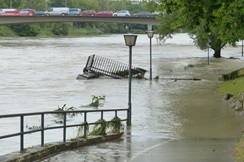Aston Charles on duty during the Cumbrian floods
(blank)
Having been on holiday during the Cumbrian floods of November 2009, Aston Charles’ Senior Consultant and Lake District aficionado Richard Jones jumped at the chance to return the Lakes last week to see how Keswick was coping with the aftermath and discover the impact such destruction had on the insurance industry.
“I saw firsthand the devastating aftermath flooding had on the small town back in November, so I was eager to make a return to Keswick to see how things had progressed several months on,” said Richard. He continued, “it was readily apparent to me that the value of claims was going to exceed the £100M initial estimate made by the ABI.”
Like other Cumbrian towns such as Workington and Cockermouth, Keswick has suffered greatly as a result of the floods. Whilst accompanying a Keswick Flood Action Group representative around the town centre, Richard was shown an area that had been flooded by 1 metre deep waste water from where an outdated sewage pumping station could not cope with the volume of surface water swamping the foul water system.
As a regular visitor to the Lakes who also works within the insurance industry, Richard is in a unique position to comment on the floods. In the aftermath of the November storms he was involved in the recovery effort, helping to patrol bridges which were temporarily closed due to safety worries, but within days of helping locals clean up, he was retained by a national Insurance Restoration company to undertake a headhunt assignment for their new Cumbrian office.
Venturing into one of the towns charming hostelries, Aston Charles’ ‘man in Keswick’ spoke to locals about their thoughts on the industry. One business owner spoke at length about ‘nagging uncertainty as to whether they are likely to get insurance cover again when their policy comes up for renewal, if it will be at a reasonable rate and if the excess will become prohibitive’. Others talked about how difficult it had been to speak to their Loss Adjusters and that there didn’t seem to be the infrastructure in place with such volume of claims, a situation exacerbated recently by the thaw and another vast number of claims for burst pipes countrywide.
Richard is pictured in one Guest House where, two months after the flood waters had subsided, the floor boards are still up and the rooms echo to the faint buzz of numerous dehumidifiers. Having suffered a massive flood in 2005, the proprietors point out that “unless the Environment Agency and United Utilities come together and develop a strategy, continued flooding in Keswick will be a sad and regular fact of life.”
Back at his desk in Leeds, Richard has had time to reflect on what he has witnessed in the Lakes. Having attended the recent Leeds Insurance Institute Lunchtime Lecture hosted by BBC Climate Correspondent, Paul Hudson, the words of the flooded Bed & Breakfast owners seems chillingly haunting. “Having undertaken my own research into the subject, I conclude that climate change is here to stay, and agree that there really needs to be a coordinated response from all stakeholders to protect those in ‘at risk’ areas”, says Richard.
Despite the devastating floods, the town of Keswick is still very much ‘open for business’ and the local economy will benefit greatly from tourism. For more information please contact the Keswick Tourist Association at www.keswick.org
To find out more about Keswick Flood Action Group, please visit www.keswickflood.org









